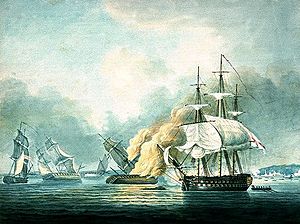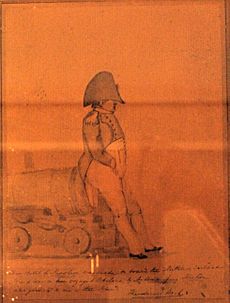HMS Northumberland (1798) facts for kids

Destruction of the French Frigates Arianne & Andromaque 22nd May 1812.
The image shows the last stages of the action of 22 May 1812. From left to right: Mameluck, Ariane, Andromaque and Northumberland. |
|
Quick facts for kids History |
|
|---|---|
| Name | HMS Northumberland |
| Ordered | 10 June 1795 |
| Builder | Barnard, Deptford |
| Laid down | October 1795 |
| Launched | 2 February 1798 |
| Honours and awards |
|
| Fate | Broken up, 1850 |
| Notes | Hulked, February 1827 |
| General characteristics | |
| Class and type | America-class ship of the line |
| Tons burthen | 1907 (bm) |
| Length | 182 ft (55 m) (gundeck) |
| Beam | 48 ft 7+1⁄2 in (14.821 m) |
| Depth of hold | 21 ft 7 in (6.58 m) |
| Propulsion | Sails |
| Sail plan | Full-rigged ship |
| Armament |
|
HMS Northumberland was a powerful British warship from a long time ago. It was a "74-gun third-rate ship of the line," meaning it had 74 cannons and was a main fighting ship. This famous ship was built in Deptford, England, and launched in 1798. Its most well-known job was carrying the famous French leader, Napoleon, to his final exile on the island of St Helena.
Contents
Adventures of HMS Northumberland
Early Captures and Rewards
Northumberland was part of the Royal Navy, the British navy. It often worked with other ships to capture enemy vessels. For example, in 1800, Northumberland and several other British ships captured a French ship called Vengeance near Malta. They all shared the rewards from this capture.
In 1801, Northumberland was again with other British ships when they captured a French ship named St. Roche. This ship was carrying many goods like wine and ironware. Because Northumberland helped in the navy's campaign in Egypt that year, its crew later received a special medal clasp called "Egypt." This was a way to honor their service.
Intercepting the Comet
In August 1803, Northumberland stopped a ship named Comet near Plymouth. The French had captured Comet earlier that year while it was sailing from England to India. An American company had bought Comet from the French. Northumberland intercepted it and sent it back to Plymouth.
Battle of San Domingo
One of Northumberland's most important battles was the Battle of San Domingo in 1806. This was a big naval fight where the British navy defeated a French fleet. Northumberland was damaged in this battle. It also had the most casualties of any British ship, with 21 sailors killed and 74 wounded.
Capturing More Ships
In 1807, Northumberland was part of a group of ships led by Rear-Admiral Alexander Cochrane. This group captured three more ships: Telemaco, Carvalho, and Master.
Later that year, Northumberland joined an expedition to take over the Danish West Indies. Britain was worried that Denmark might team up with Napoleon. So, the British captured the islands of St Thomas and Santa Cruz. The Danes did not fight back, so no one was hurt in this takeover.
In 1810, Northumberland and another British ship, HMS Armada, captured a French privateer. A privateer was a private ship allowed to attack enemy ships. This French ship was a 14-gun ketch called La Glaneuse.
Carrying Napoleon to Exile
Northumberland became very famous in 1815. It was the ship that carried Napoleon Bonaparte to his final exile. Napoleon had surrendered to another British ship, HMS Bellerophon. He was then taken to Plymouth, England.
However, the British decided that the old Bellerophon was not suitable for such a long journey. So, Napoleon was moved from Bellerophon to Northumberland in Tor Bay, Devon. Northumberland then took him on his long voyage to the remote island of St. Helena, where he would live out the rest of his life.
In 1817, Northumberland also helped seize some glass from a ship called Mary of London.
End of Service
Northumberland had a long and active career. In February 1827, it was turned into a hulk. A hulk is an old ship that is no longer used for sailing but is kept afloat for other purposes, like storage or as a prison. Northumberland was eventually taken back to Deptford in 1850 and taken apart.
 | Delilah Pierce |
 | Gordon Parks |
 | Augusta Savage |
 | Charles Ethan Porter |


